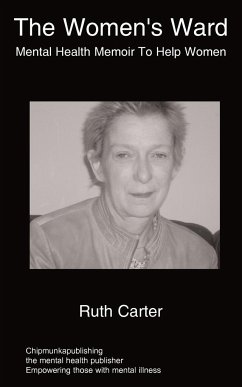Description The story begins as R is dumped at the door of the psychiatric hospital by her husband and is totally disorientated by alcohol and by the residue of the tablets she has taken that night. The story revolves around the strong bonds the women in the psychiatric hospital forge and their support for each other. It is seen through the eyes of R who becomes something of an observer. It deals with a variety of mental health issues and the treatment on offer, which generally consists of enforced medication and "nicotine therapy". No counselling or rehabilitation is provided and the exercise bike is kept in bubble wrap in a cupboard. It also poses questions of human rights abuses, especially for the majority who are "sectioned". No right to vote. Small violations of hospital rules can result in a patient being confined to the ward for several weeks, although none of them are a threat to the public. In addition, visiting rights can be curtailed. The whole story is seen through R's eyes. She is the only voluntary patient so is allowed out but when she comes back, she is body searched, and her shopping is emptied onto the bed and rummaged through. She expresses a feeling of humiliation but is reminded that if she complains she too can be sectioned. Two women have ECT. One, Thelma, recovers her ability to speak coherently within weeks, but Kit, who also undergoes the treatment, has trouble with even the smallest recollections, deteriorates with each treatment and eventually has to be reminded of her name. She doesn't recover. Nicky, a huge woman with livid tattoo, a history of self-harm and a foul mouth, becomes the matriarch, looking after the weaker members of the enclosed society. The book also looks at the standard of care offered. Some staff are supportive and able to relate to their patients while others verge on the sadistic. As an example, a young Filipino is sexually assaulted by a fellow inmate in full view of staff who merely monitor the situation. Two of the patients intervene but are rebuked for interfering and have their home leave cancelled. The women's time is concentrated on the weekly review meetings which decide whether they can have home leave or even a walk in the garden. There are no set appointments so a six hour wait is not unusual. When two of the girls are accepted into a half-way house, the others throw a party for them and a collection is made. However, when R returns with the food, most of it is put in the bin because of Health and safety issues. The girls rally round and organise a dance, being only allowed to eat crisps and nuts. At the end of the story, R is eventually allowed home but has now become aware of the destructive nature of her marriage. Her husband is patronising, tactless and belittles her. But now R has gathered enough strength to leave him. This story is about the heroism of women who make it through their personal traumas only to be met by the gates of the system. It is about those who have no voice.
Hinweis: Dieser Artikel kann nur an eine deutsche Lieferadresse ausgeliefert werden.
Hinweis: Dieser Artikel kann nur an eine deutsche Lieferadresse ausgeliefert werden.









